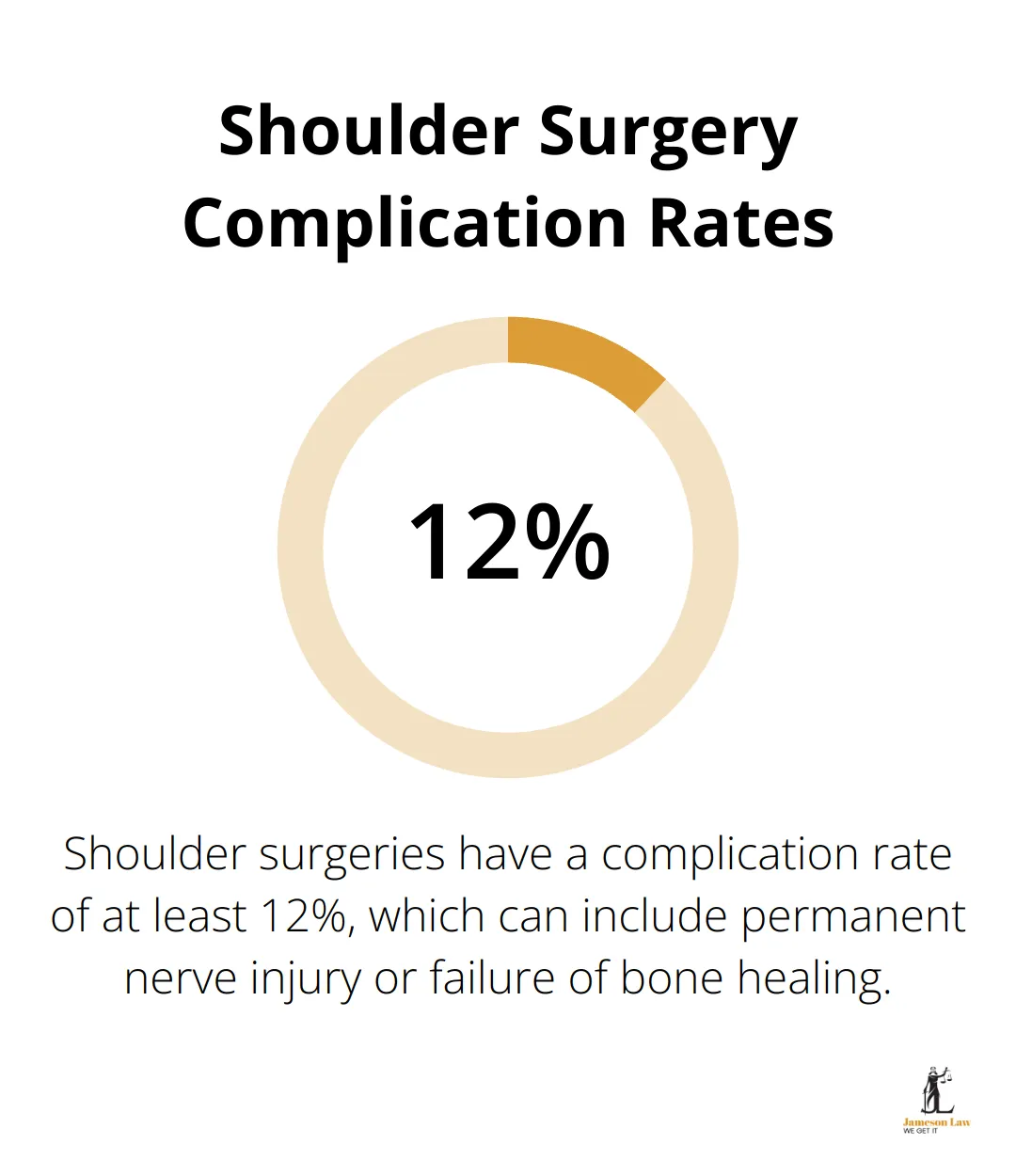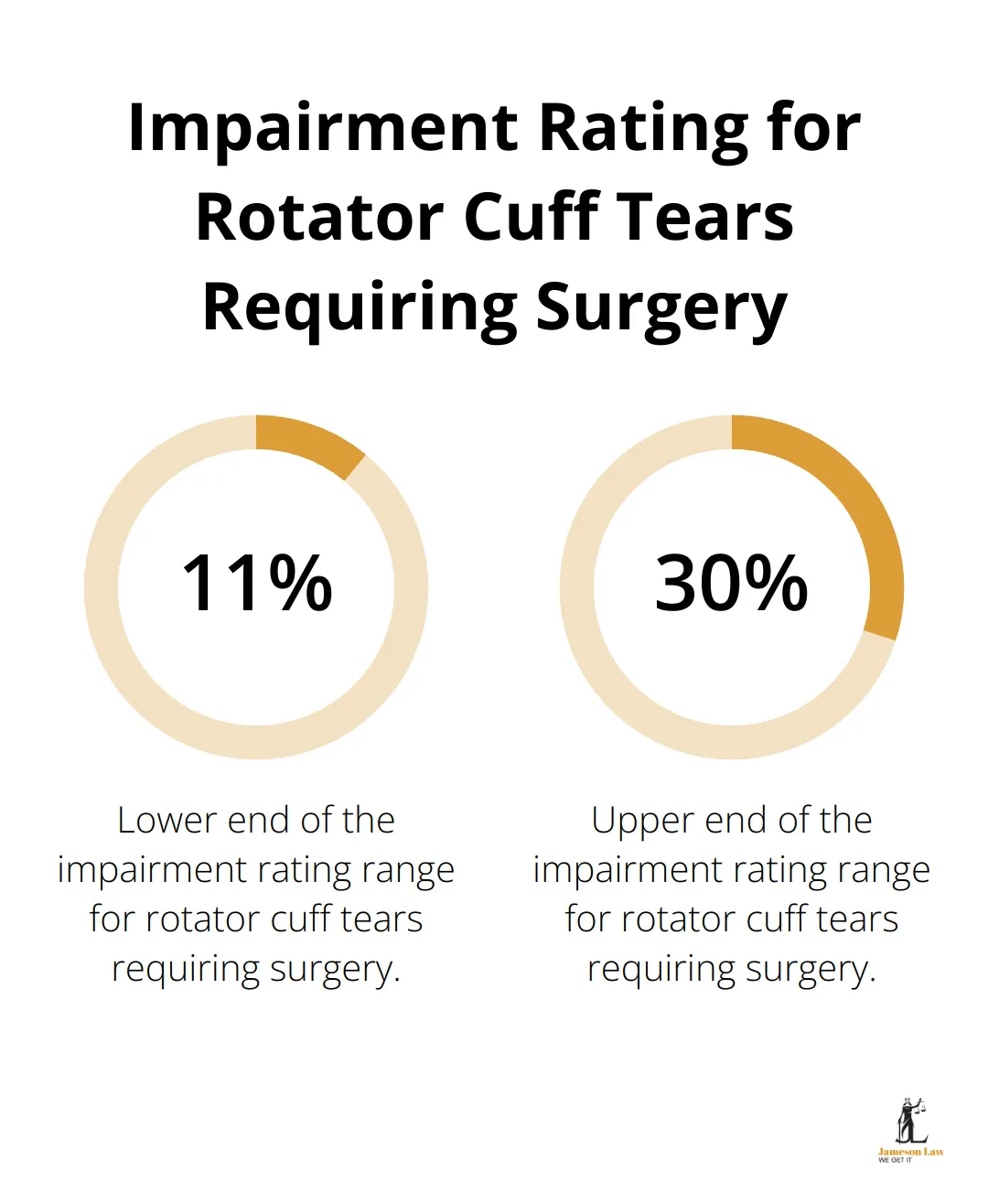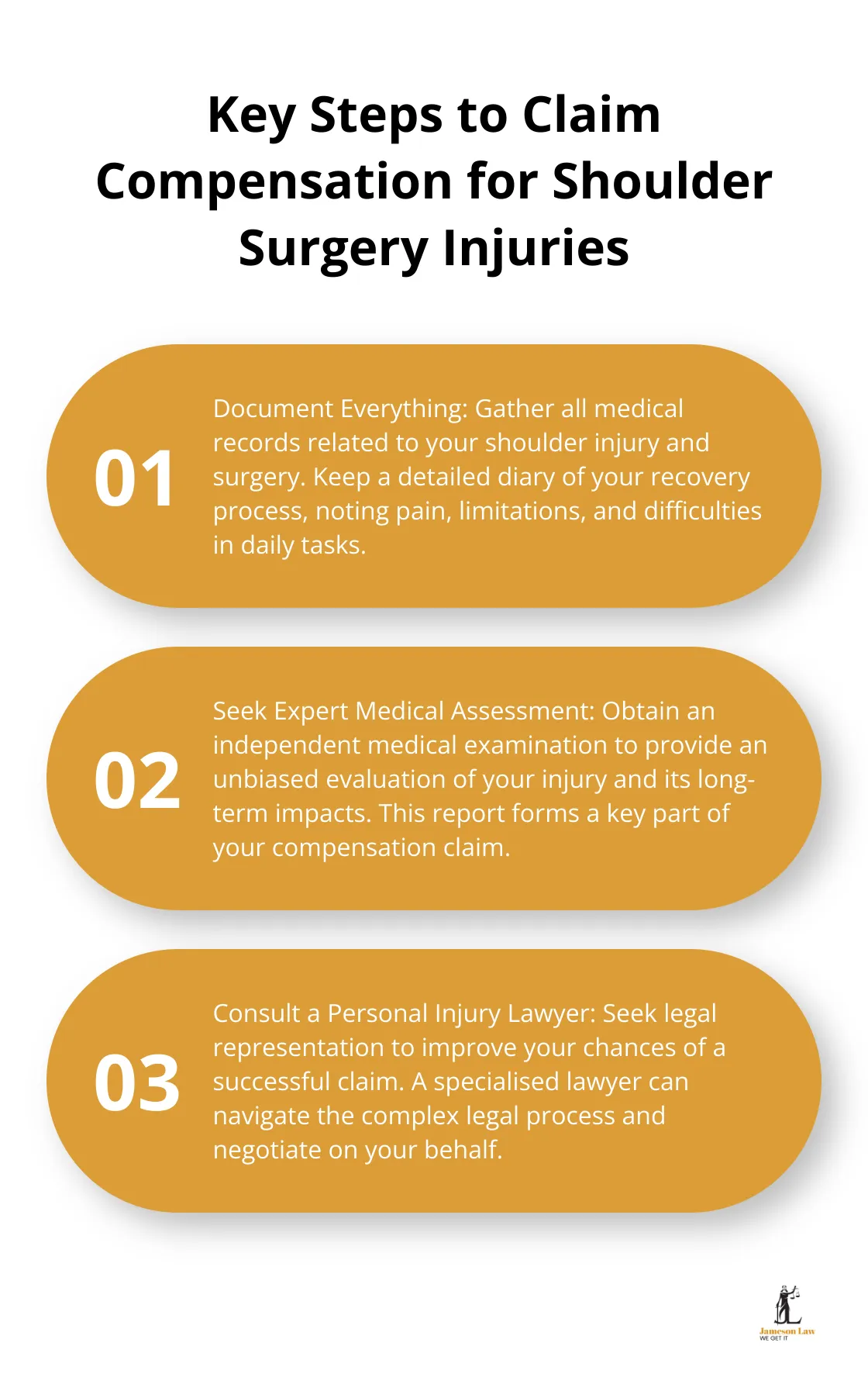Shoulder surgery injuries can have devastating effects on your life, impacting your ability to work, enjoy hobbies, and perform daily tasks. At Jameson Law, we understand the physical, emotional, and financial toll these injuries can take.
If you’ve suffered a shoulder injury requiring surgery due to someone else’s negligence, you may be entitled to compensation. This guide will walk you through the process of seeking compensation for shoulder injury requiring surgery, helping you understand your rights and the steps to take.
Common Shoulder Surgery Injuries and Their Impact
Types of Shoulder Surgery Injuries
Shoulder surgery injuries can significantly alter lives, often stemming from medical negligence or procedural complications.
Rotator cuff tears rank among the most frequent injuries. These can occur during arthroscopic procedures if a surgeon accidentally damages the tendons. In severe cases, patients experience complete rotator cuff failure post-surgery, leading to chronic pain and limited mobility.
Nerve damage presents another serious concern. The axillary nerve, which runs close to the surgical site, can sustain injury during shoulder operations. This results in deltoid muscle weakness and numbness in the shoulder area. Complication rates of 12% (and higher) are often quoted for shoulder surgeries, varying from permanent nerve injury to failure of bone healing.

Infections pose a risk in any surgical procedure but can prove particularly devastating in shoulder surgeries. Deep infections can lead to joint destruction and may require multiple follow-up surgeries to treat.
Causes of Shoulder Surgery Injuries
Medical negligence stands as a leading cause of shoulder surgery injuries. This includes errors in surgical technique, inadequate sterilisation procedures, or failure to properly diagnose and treat complications. In some instances, surgeons have operated on the wrong shoulder or used inappropriate implants.
Anaesthesia errors can also result in serious injuries. Patients have suffered nerve damage due to improper positioning during surgery or complications from nerve blocks.
Post-operative care plays a crucial role, and negligence in this area can exacerbate injuries. Failure to monitor for infection, inadequate pain management, or improper rehabilitation instructions all contribute to poor outcomes.
Long-term Impacts on Quality of Life
The effects of shoulder surgery injuries extend far beyond the operating room. Many patients experience chronic pain that persists long after the initial recovery period. This can lead to dependence on pain medication and impact mental health.
Loss of function presents a significant concern. Patients often find themselves unable to return to their previous jobs due to limited range of motion or weakness in the affected arm. This can have severe financial implications, especially for those in physically demanding professions.
The psychological impacts of shoulder surgery injuries should not be underestimated. The frustration of a failed surgery, coupled with ongoing pain and disability, can lead to depression and anxiety. In some cases, relationships strain as partners become carers.
Understanding these common injuries, their causes, and long-term impacts forms the first step in seeking compensation. The next section will explore the legal rights and compensation options available to those who have suffered shoulder surgery injuries.
What Compensation Can You Claim for Shoulder Surgery Injuries?
Workers Compensation Claims
Shoulder surgery injuries from workplace accidents or job duties may qualify for workers compensation in New South Wales. This compensation covers medical expenses, rehabilitation costs, and a portion of lost wages. You must file these claims within six months of the injury or when you first became aware of it.
The State Insurance Regulatory Authority (SIRA) of NSW outlines substantial compensation for shoulder injuries requiring surgery. A rotator cuff tear that requires surgery would typically indicate an impairment rating in the range of 11-30%.

Medical Negligence Claims
If a medical professional’s negligence caused your shoulder surgery injury, you might have grounds for a medical negligence claim. These claims cover medical expenses, lost income, and compensation for pain and suffering.
A recent case saw a patient receive a $550,000 settlement after an orthopaedic surgeon’s negligence worsened a rotator cuff tear and necessitated additional surgeries. This case highlights the potential for significant compensation in shoulder surgery malpractice cases.
Public Liability Claims
Shoulder injuries occurring in public places or on private property due to negligence may qualify for public liability claims. These claims cover medical expenses, lost income, and compensation for pain and suffering.
In NSW, you typically have three years from the date of injury to file a public liability claim. However, you should seek legal advice promptly to avoid missing any critical deadlines.
No Win No Fee Arrangements
Many personal injury lawyers in NSW offer No Win No Fee arrangements for shoulder surgery injury claims. This arrangement means you don’t pay legal fees unless your claim succeeds, making legal representation accessible to more people.
It’s important to understand the terms of these agreements. While you won’t pay legal fees for unsuccessful claims, you may still be responsible for other costs (such as medical reports or court fees).
When seeking compensation for shoulder surgery injuries, prompt action is vital. Early action ensures you meet legal deadlines and allows for better preservation of evidence and witness statements. To maximise your chances of a successful claim, you should consult with a personal injury lawyer experienced in shoulder injury cases. They will guide you through the complex legal process and help you understand your options for compensation.
How to Claim Compensation for Shoulder Surgery Injuries
Document Everything
The first step in claiming compensation is to gather comprehensive evidence. This includes all medical records related to your shoulder injury and subsequent surgery. Request copies of your surgical reports, post-operative care instructions, and follow-up appointment notes. These documents provide vital evidence of the extent of your injury and the treatment you’ve received.
Keep a detailed diary of your recovery process. Note any pain, limitations in movement, or difficulties in performing daily tasks. This personal account can be powerful evidence of how the injury has impacted your life.
If your injury occurred at work or in a public place, gather any incident reports or witness statements. Photographs of the accident scene or your injury can also strengthen your case.
Seek Expert Medical Assessment
An independent medical examination is often necessary to support your claim. This assessment provides an unbiased evaluation of your injury and its long-term impacts. The State Insurance Regulatory Authority (SIRA) maintains a list of approved medical specialists for this purpose.
The medical report should detail the extent of your injury, any permanent impairment, and how it affects your ability to work and perform daily activities. This report forms a key part of your compensation claim.
Consult a Personal Injury Lawyer
While not mandatory, seeking legal representation can significantly improve your chances of a successful claim. Personal injury lawyers specialising in shoulder surgery injuries understand the complexities of these cases and can navigate the legal process on your behalf.
Most reputable law firms offer free initial consultations. Use this opportunity to discuss your case and understand your legal options. Ask about their experience with similar cases and their success rate.
File Your Claim and Negotiate
Once you’ve gathered all necessary evidence and sought legal advice, it’s time to file your compensation claim. Your lawyer will help you complete the required forms and submit them to the relevant insurance company or coompensation scheme.
Prepare for a potentially lengthy negotiation process. Insurance companies often try to minimise payouts, so having a skilled negotiator on your side is important. Your lawyer will advocate on your behalf, using the evidence you’ve gathered to argue for fair compensation.
Accepting the first offer isn’t always in your best interest. Your lawyer can advise you on whether an offer is fair based on the specifics of your case and potential long-term impacts of your injury (which can include ongoing medical expenses and loss of earning capacity).

Choose the Right Legal Representation
Selecting the right legal team is paramount to the success of your claim. Look for firms with extensive experience in shoulder surgery injury cases and a proven track record of successful outcomes.
While many firms offer services in this area, Jameson Law stands out with over 40 years of combined experience in handling complex injury cases (including those involving shoulder surgery injuries). Their No Win No Fee policy for personal injury claims ensures you can access expert legal representation without upfront costs.
Final Thoughts
Compensation for shoulder injury requiring surgery involves a complex process. You must document your injury, seek expert medical assessment, and consult with a personal injury lawyer to build a strong case. Time limits apply to filing claims, so prompt action preserves vital evidence and meets legal deadlines.
Expert legal support can significantly impact your claim’s outcome. A skilled lawyer will navigate the legal system, negotiate with insurance companies, and fight for the compensation you deserve. They will help you understand various claim types and guide you towards the most appropriate option for your situation.
Jameson Law offers expert assistance for those seeking compensation for shoulder surgery injuries. We provide tailored legal support to maximise your chances of a successful claim. Our No Win No Fee policy (for personal injury claims) ensures access to high-quality legal representation without upfront costs.













